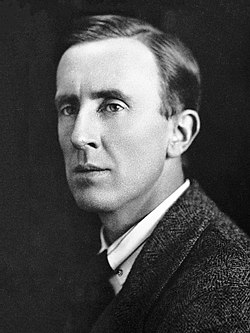J.R.R. Tolkien Quote
Not long ago-incredible though it may seem-I heard a clerk of Oxford declare that he 'welcomed' the proximity of mass-production robot factories, and the roar of self-obstructive traffic, because it brought his university into 'contact with real life.' He may have meant that the way men were living and working in the twentieth century was increasing in barbarity at an alarming rate, and that the loud demonstration of this in the streets of Oxford might serve as a warning that it is not possible to preserve for long an oasis of sanity in a desert of unreason by mere fences, without actual offensive action (practical and intellectual). I fear he did not. In any case the expression 'real life' in this context seems to fall short of academic standards. The notion that motor-cars are more 'alive' than, say, centaurs or dragons is curious; that they are more 'real' than, say, horses is pathetically absurd. How real, how startlingly alive is a factory chimney compared with an elm tree: poor obsolete thing, insubstantial dream of an escapist!
Not long ago-incredible though it may seem-I heard a clerk of Oxford declare that he 'welcomed' the proximity of mass-production robot factories, and the roar of self-obstructive traffic, because it brought his university into 'contact with real life.' He may have meant that the way men were living and working in the twentieth century was increasing in barbarity at an alarming rate, and that the loud demonstration of this in the streets of Oxford might serve as a warning that it is not possible to preserve for long an oasis of sanity in a desert of unreason by mere fences, without actual offensive action (practical and intellectual). I fear he did not. In any case the expression 'real life' in this context seems to fall short of academic standards. The notion that motor-cars are more 'alive' than, say, centaurs or dragons is curious; that they are more 'real' than, say, horses is pathetically absurd. How real, how startlingly alive is a factory chimney compared with an elm tree: poor obsolete thing, insubstantial dream of an escapist!
Related Quotes
About J.R.R. Tolkien
From 1925 to 1945 Tolkien was the Rawlinson and Bosworth Professor of Anglo-Saxon and a Fellow of Pembroke College, both at the University of Oxford. He then moved within the same university to become the Merton Professor of English Language and Literature and Fellow of Merton College, and held these positions from 1945 until his retirement in 1959. Tolkien was a close friend of C. S. Lewis, a co-member of the informal literary discussion group the Inklings. He was appointed a Commander of the Order of the British Empire by Queen Elizabeth II on 28 March 1972.
After Tolkien's death his son Christopher published a series of works based on his father's extensive notes and unpublished manuscripts, including The Silmarillion. These, together with The Hobbit and The Lord of the Rings, form a connected body of tales, poems, fictional histories, invented languages, and literary essays about a fantasy world called Arda and, within it, Middle-earth. Between 1951 and 1955 Tolkien applied the term legendarium to the larger part of these writings.
While many other authors had published works of fantasy before Tolkien, the tremendous success of The Hobbit and The Lord of the Rings ignited a profound interest in the fantasy genre and ultimately precipitated an avalanche of new fantasy books and authors. As a result he has been popularly identified as the "father" of modern fantasy literature and is widely regarded as one of the most influential authors of all time.
